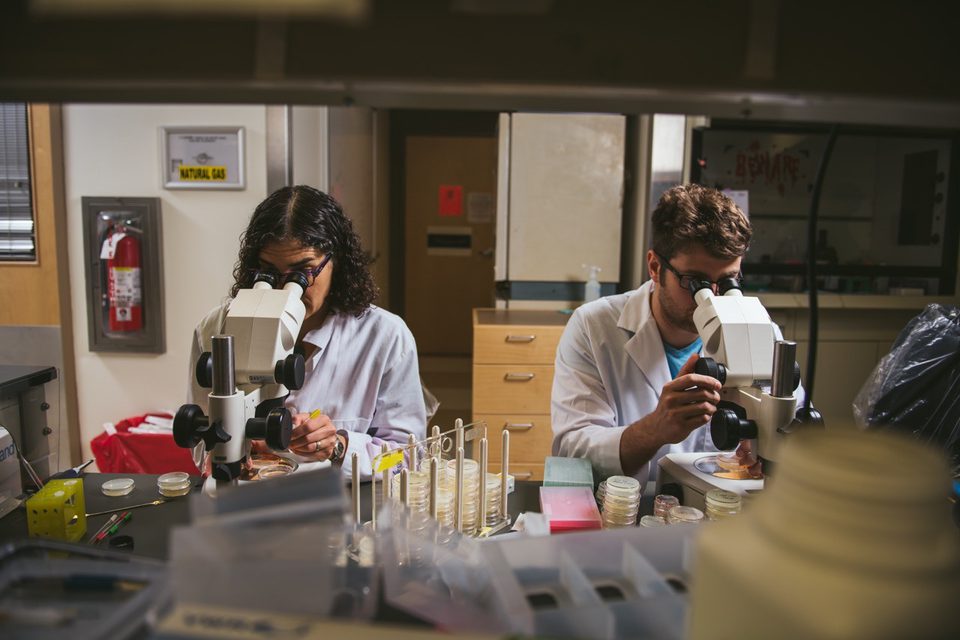Q&A With Dr. Judith Yanowitz

The educational and mentoring programs at Magee-Womens Research Institute support the next generation of women’s health scientists across academic levels. Dr. Judith Yanowitz oversees educational programming at Magee-Womens and provides updates and vision for the High School Internship and Teachers' Academy programs.
HIGH SCHOOL INTERNSHIPS
Q: What is the High School Internship Program?
Dr. Yanowitz: Students are embedded in research groups, engaging in basic, translational, or clinical scientific activities. They work on a variety of projects, from basic bench science in my lab, where they move worms from plate to plate, to coding recordings and studying doctor-patient communication.
Each year, we accept ten students and offer a faculty-sponsored position for underrepresented individuals. Traditionally, we receive 130 to 150 applications from the Pittsburgh area. The current organizers strongly believe in supporting and growing the local workforce.
Q: What can you tell us about last summer’s program?
Dr. Yanowitz: In 2024, we had our highest enrollment yet. The internship used to be a four-week program, and it was amazing what students could do in that time. However, this year we rolled out a six-week program and had several faculty members take multiple students. The group work should grow organically from the ongoing work that the faculty are doing. I started by mentoring one student, then expanded to a couple. From what we accomplished this summer, I can imagine running a group project with four to six students in the future. I would love to see the program evolve to include multiple group projects, allowing students to come together to take on bigger challenges.
Q: What types of career development are offered for the participants?
Dr. Yanowitz: High School students take part in “lunch and learn” sessions together with the college summer interns. The series has faculty, post-doc, and student presentations about both their research and their career trajectories. We give students opportunities to know their cohort. As many students will be heading to different schools or colleges, our goal is for them to leave the program having made friends, shared experiences, and discovered common interests in science.
Q: What should future applicants know?
Dr. Yanowitz: This is a program you need to have on your radar in the fall. The application typically opens in mid-November to early December. Applicants need two letters of recommendation and a commitment to science, particularly to women’s and reproductive health. We want to use this program as a launching pad for a pipeline of researchers in women's health.
TEACHERS’ ACADEMY
Q: What is the Teachers' Academy?
Dr. Yanowitz: The Teachers' Academy aims to educate educators. We invite teachers to spend time in our labs, learning about research that can be adapted for high school classrooms. One teacher completed a two-week session with us. The teacher spent the first week learning worm research in my lab, which can be easily applied to a high school setting. In the second week, the teacher met with various faculty members to explore research projects that could fit into high school curricula.
Q: What is your hope for the future of the Teachers’ Academy?
Dr. Yanowitz: In the future, I hope to expand the program to include three or four teachers at a time, ideally overlapping with our high school program. This expansion would allow teachers to interact with students, see their skills, and understand what they can achieve in a short period. We aim to develop a variety of modules from different labs and programs at Magee-Womens, creating a resource for high school educators.
Q: How does the Teachers’ Academy broaden your impact?
Dr. Yanowitz: The Teachers' Academy allows us to reach a wider audience, including populations that might not typically engage with our research. By going into local schools and working with teachers, we can connect with students from diverse backgrounds, fostering a broader understanding of our work.
Q: How can people support the Teachers’ Academy?
Dr. Yanowitz: To make this program successful, we need to offer teachers a fair salary for their participation. They act as emissaries, bringing our research into their communities with our support. To ensure the sustainability of the program, we require substantial funding, ideally an endowment. For more information on supporting the Teachers' Academy, please reach out to Janice Devine, Executive Director, Development at 412-641-8973 or devineja@upmc.edu.
Be the First to Know
Get the latest research, news, events, and more delivered to your inbox.